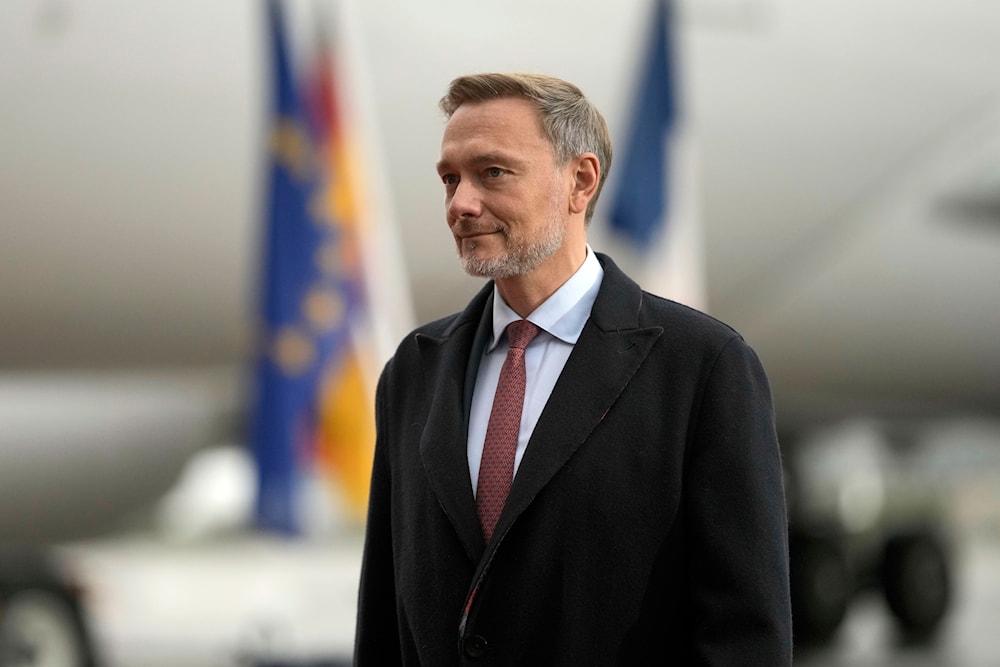German FM describes German economy as an 'unfit man'
Germany's Finance Minister states that the EU requires a single capital market for private investment to replace endless subsidizing.
-

German Finance Minister Christian Lindner arrives for a joint cabinet meeting of the German and French Governments in Hamburg, Germany, Monday, Oct. 9, 2023(AP)
Finance Minister Christian Linder stated at the London School of Economics on Monday that Germany needs structural reforms to boost its competitiveness.
This came after Germany was declared by the IMF as having the weakest performance among large economies in the world and was labeled once again “the sick man of Europe”.
Linder objected to this label, stating that “some say Germany is the sick man of Europe, I don’t think so,” adding “we are an unfit man.” The “sick man” label was famously given to Germany by The Economist in 1999 as the country struggled with the challenges of reunification and reduced export demand.
The German economy has shrunk by 0.3% year-on-year in 2023, as energy costs have risen, global orders have dulled, and interest rates have increased.
The IMF expects the German economy to grow by only 0.9% in 2024, well below the 1.4% predicted for advanced economies.
Linder further stated that Germany is “healthy, but not in the best shape,” while comparing the German and UK economies which he believes “both are in a downturn.” He previously compared Germany to a “tired man” in need of a cup of coffee of structural reforms, last month.
“It is unlikely that any economy is capable of paying subsidies for a very long time,” Linder said in an attempt to stress his belief that the EU requires a single capital market for private investment replacing endless subsidizing.
In another comment made to Bloomberg, the minister announced that Germany’s economy would be ruined if it followed the UK out of the EU, stressing that the single market is of the “utmost importance” to Germany.
Last month, Alice Weidel, the co-leader of the far-right Alternative for Germany (AfD) party, called Brexit a “model for Germany," and suggested holding a referendum to “let the people decide, just as Britain did.”
Linder commented on this proposal stating “It would ruin our economy,” adding “This is why we have to tell people, OK, you maybe are not in line with government policies but this is no reason for changing the complete system and for changing what our wealth is based on.”
It all started when Germany boycotted Russia
As German manufacturers have been struggling to maintain cost-competitive products, the loss of cheap Russian natural gas due to the war in Ukraine has served as a "final blow" for Germany. The country's reign as an industrial superpower seems to be “coming to an end," Bloomberg News said on February 11.
Most Russian imports were boycotted in 2022 as a "punishment", which pushed Germany's already declining industrial output since 2017 further down the line. Bloomberg announced that century-old factories are closing and other companies are moving production lines to more cost-friendly countries, Bloomberg said.
CEO at GEA Group AG, machinery producer, Stefan Kelbert, stated, “There’s not a lot of hope if I’m honest,” adding, with concern, “I am really uncertain that we can halt this trend. Many things would have to change very quickly.”
The Federation of German Industries previously released a survey last September revealing that the top reasons for shifting investment abroad are concerns over energy security and energy costs.
BASF SE, Europe’s biggest chemical producer, and Lanxess AG are letting go of thousands of employees as chemical makers were among the manufacturers affected the most by the boycotting of Russian gas. French tiremaker Michelin and US rival Goodyear are also closing or downsizing their German plants.

 4 Min Read
4 Min Read








